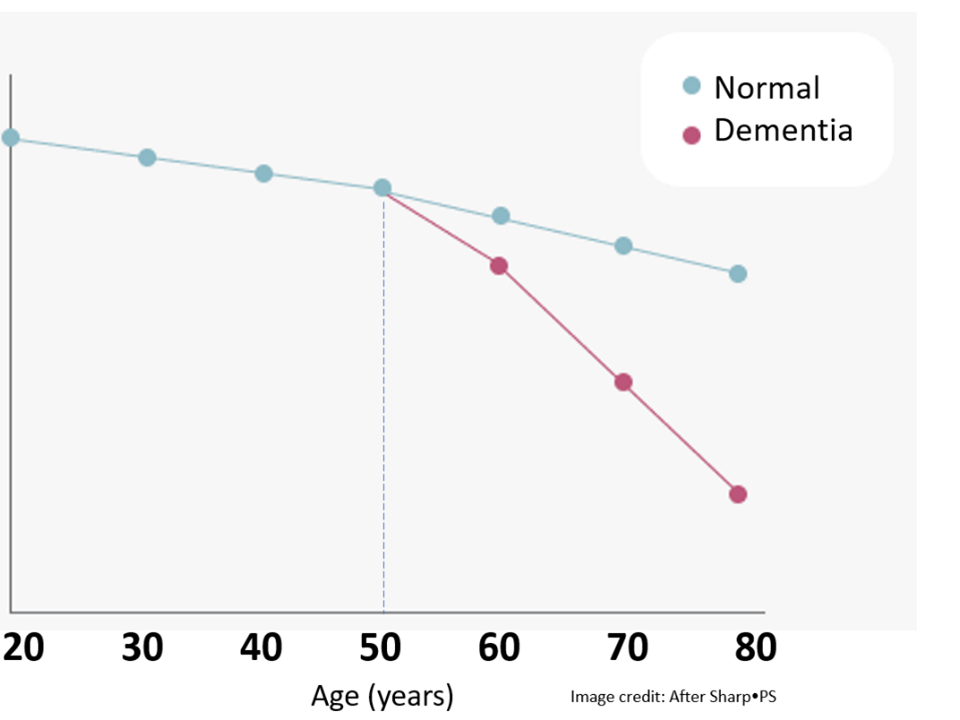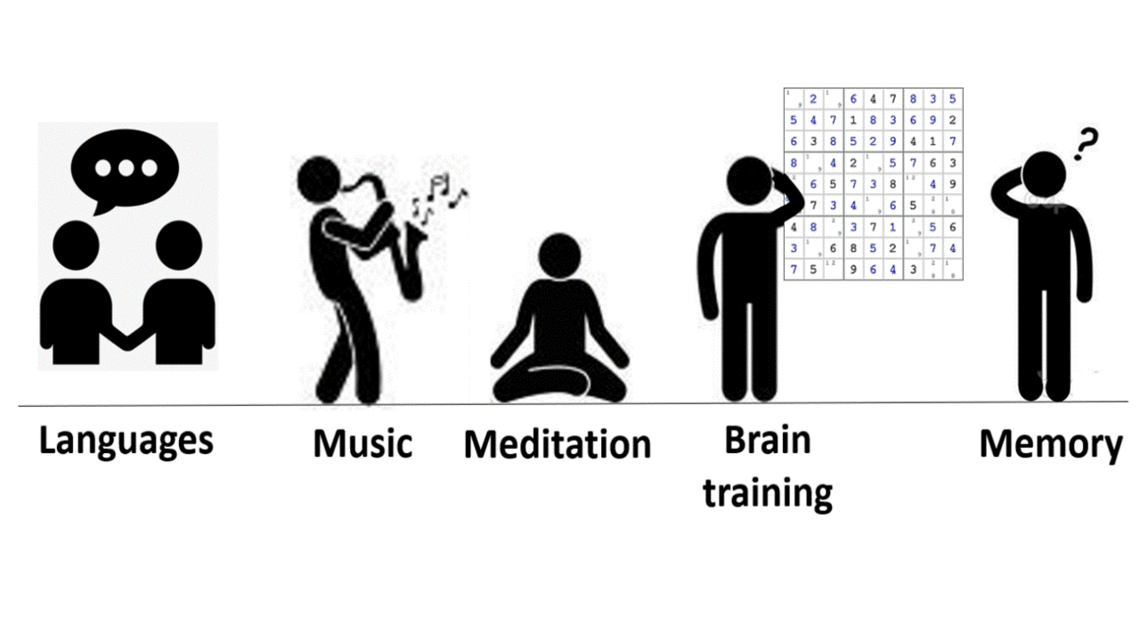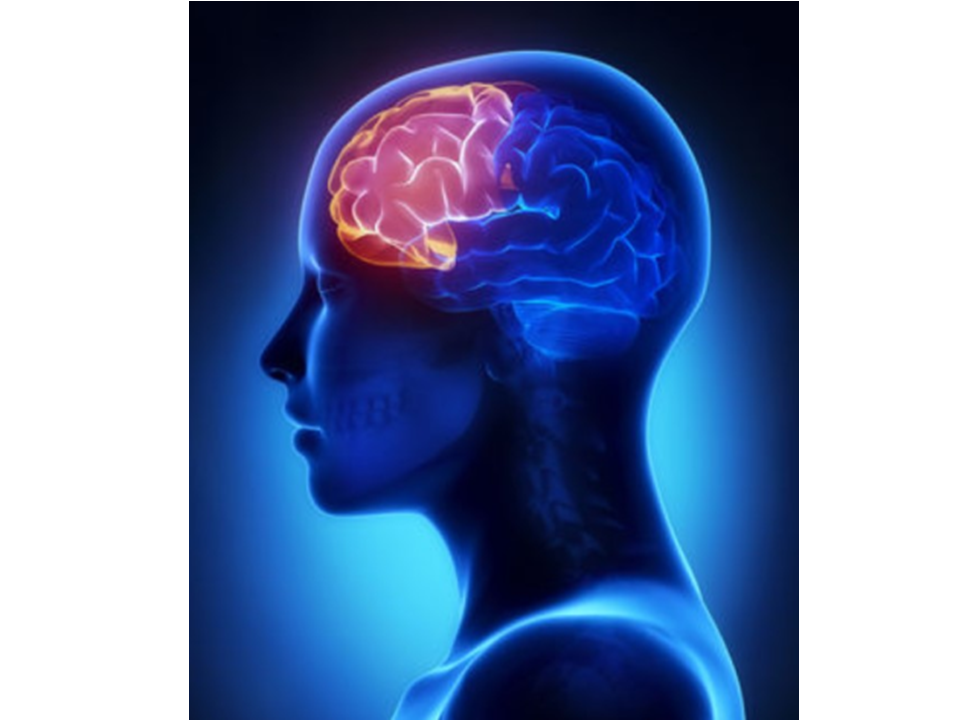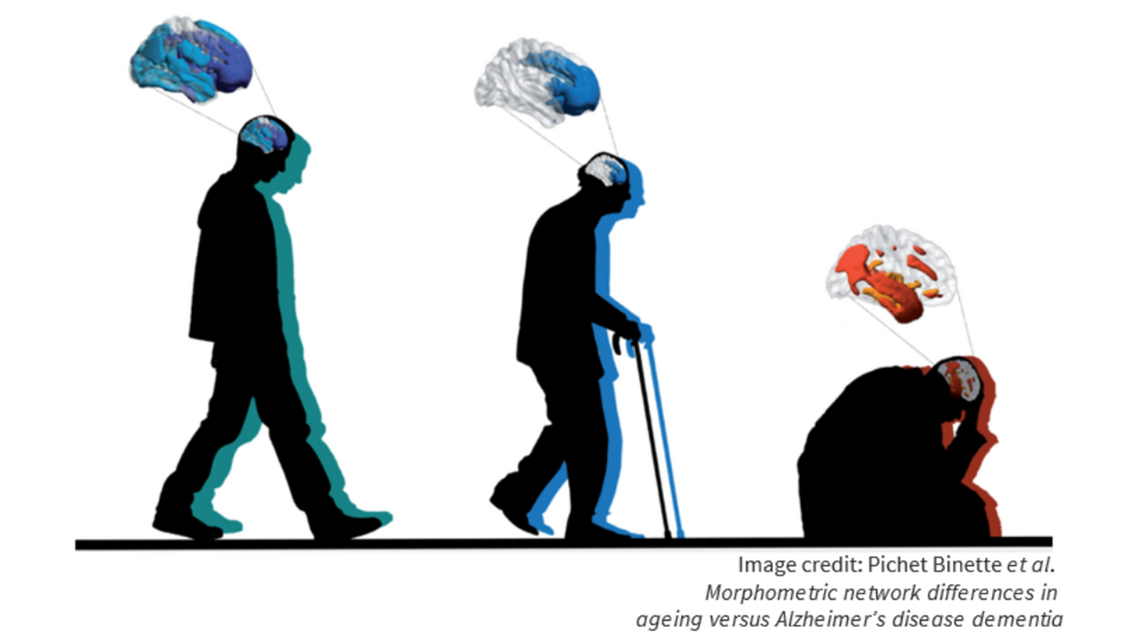Our bodies change as we get older – do our brains also change? If so, is there anything we can do to compensate? Can you teach an old dog new tricks?
- Ageing and cognitive decline
- Can our brains adapt?
- ‘Neurocognitive scaffolding’ – our brain’s Plan B?
- A comparison between an ageing brain and an Alzheimer’s brain
- Cognitive reserve – can we do anything to protect our brains?
- Brain training and a healthier lifestyle
- Mental fitness – a spectrum?
- What can we do to help keep mentally fit as we get older?
Ageing and cognitive decline
As we get older our brains shrink, and some cognitive functions, such as memory and speed of mental processing, can deteriorate. For example, neuroimaging shows that there are age differences in neural structure and function that contribute to memory performance. And, as we live longer, the number of cases of dementia is rising. This helps explain why we tend to have a negative perception of our mental ability as we age.
|
One of the most striking aspects of ageing is that our memory processes can start showing a decline after 50. |

A 2018 systematic review found that there was no ‘sequence of decline’ before mild cognitive impairment (MCI) or death. However, those with Alzheimer’s showed a sequence of decline that involved verbal memory, executive function, verbal IQ and visuospatial ability. This indicates that those who are at risk of Alzheimer’s, are more likely to exhibit several different aspects of cognitive decline.
Can our brains adapt?
|
Mental decline is not inevitable. |
Fortunately, there’s increasing evidence that our brains can adapt, and there is much we can do to keep mentally fit as we get older. You can teach an old dog new tricks, as a New Scientist article explained in 2013. History is also full of examples of how older people can keep mentally fit. Leo Tolstoy learned to ride a bicycle when he was 67, and Queen Victoria started to learn Hindustani at 68. In the modern world, adult education classes attract older students keen to learn new skills each year.
Mind–body interventions, such as mindfulness, yoga, and Tai Chi training, may also improve cognitive function. A 2019 systematic review considered older adults with MCI and found that mind–body interventions appeared to affect cognitive function, with improvements in memory, resilience and mindfulness. The review cautioned that more high-quality research was needed to confirm that these interventions are cost effective for improving cognitive decline in older people.
‘Neurocognitive scaffolding’ – our brain’s Plan B?
MRI scans of the human brain have suggested one possible explanation for how the brain can adapt and maintain its cognitive function. These scans have shown reliable increases in prefrontal activation, even when the brain is shrinking. This is important, because the prefrontal cortex is thought to act as the brain’s executive or conductor – helping us plan complex behaviour, express our personality and make decisions.
These observed increases in prefrontal activation have given rise to the theory of ‘neurocognitive scaffolding’ as a means by which the brain adapts as we age.
|
The hypothesis: Neurocognitive scaffolding protects the cognitive function in the ageing brain. Available evidence suggests that our brain’s ability to use this mechanism is strengthened by cognitive engagement, exercise, and engaging default networks at a low level. |
We know that human bodies have the ability to self-regulate, for instance to maintain a reasonably constant temperature. By self-regulating, the body maintains equilibrium and enables us to keep functioning in a reasonably stable way. The same principle may apply to our brains. If so, then as our brain begins to shrink and functions deteriorate, it will seek a way to self-regulate, adapt or compensate, in order to keep functioning. Neurocognitive scaffolding theory assumes that the brain adapts by engaging in ongoing reorganization and repair. This might be through strengthening existing connections, forming new connections or stopping using weak or faulty connections.
A comparison between an ageing brain and an Alzheimer’s brain
A 2020 review of data from young adults and older adults with (1) intact cognition, (2) Alzheimer’s and (3) cognitive impairment, found that:
- Ageing and Alzheimer’s played a part in the added effects on grey matter volume (our brain cell bodies responsible for sight, speech, memory, self-control, and decision making), in all networks except those belonging to the frontal lobe.
- There were no networks differentiating Alzheimer’s and ageing.
- There was diversity in grey matter volumes through morphometric networks (the structure of the networks).
- Overall, there is a loss of brain cells with ageing and with Alzheimer’s, although Alzheimer’s is distinctively associated with the interruption of the normal brain structure (i.e. its morphometric organisation).
Cognitive reserve – can we do anything to protect our brains?
The ‘neurocognitive scaffolding’ hypothesis was revisited in a 2014 article, which suggested that what happens to us in the course of our lives can influence that scaffolding. As the article indicates, this fits in with the idea that we can develop a cognitive reserve, – a mental flexibility – through education, work and interests that are intellectually challenging, and possibly even through a healthy diet. This reserve is then thought to protect our brains for longer, for example by delaying the onset of symptoms of Alzheimer's.
|
Mental flexibility is the ability to move between different mental tasks simultaneously, and to apply concepts from one context towards solving a problem in another, unrelated or new situation. |
There's more information about foods that may help protect our brains here. (You will need to register to access the website but registration is free.)
The idea of a cognitive reserve may help explain why dementia rates appear to be falling at a rate of 13% per decade over the last 25 years in both Europe and the United States, according to research published in 2020. However, this percentage effect isn't always evident due to the growing ageing populations of Europe and the United States. One suggested explanation is that people are receiving education for longer than in previous generations, and that this is helping them to build a cognitive reserve. Another explanation is that more people are pursuing healthier lifestyles, and ‘what is good for the heart is often good for the brain’.
Brain training and a healthier lifestyle
A systematic review of research published in 2015 also suggests that some commercially available brain training products can help promote healthy brain ageing.
A 2017 cross sectional study, which involved healthy participants over 65, found that those with healthier lifestyles (engaging in cognitive and social activity and physical activity, eating a healthy diet, avoiding excessive alcohol consumption, and not smoking) had better mental fitness, and this in turn was linked with greater cognitive reserve.
Mental fitness – a spectrum?
Mental fitness as we get older seems to span a spectrum. Sadly, people suffering from early-onset Alzheimer’s will start to see their mental fitness erode from their 50s or early 60s, as shown in the graph at the start of this article.
At the other end of the spectrum, many people remain mentally very fit well into their 80s and 90s. For example, Verdi was still composing operas in his 80s, and George Bernard Shaw was still writing plays in his 90s.
What can we do to help keep mentally fit as we get older?
As we report here, our brain can shrink and our cognitive functions decline as we get older. However, we can help protect our brain through education, by finding work and taking part in interests that challenge us intellectually.

- What is good for our bodies (physical exercise and a healthy diet) is usually good for our brains.
- Keeping socially active, mentally active and learning new skills also help keep our brains working well.
- Dance seems particularly helpful, as it combines physical exercise, social activity and (if the dance moves are complicated enough) mental activity.
- Mindfulness activities, such as Yoga and Tai chi may also help.
- However, passive activity, such as watching TV, is associated with an increased risk of cognitive impairment.
Reviewed and updated by Norin Begum, December 2020. Next review date November 2024
__________________________
Other relevant articles on the Age Watch website:
- Fitness: Yoga
- Fitness: Tai Chi
- Fitness: Can we dance our way to fitness?
- Mind: Keep stretching the brain
- Diet: Vitamin D and ageing
- Ageing: Telomeres and ageing


